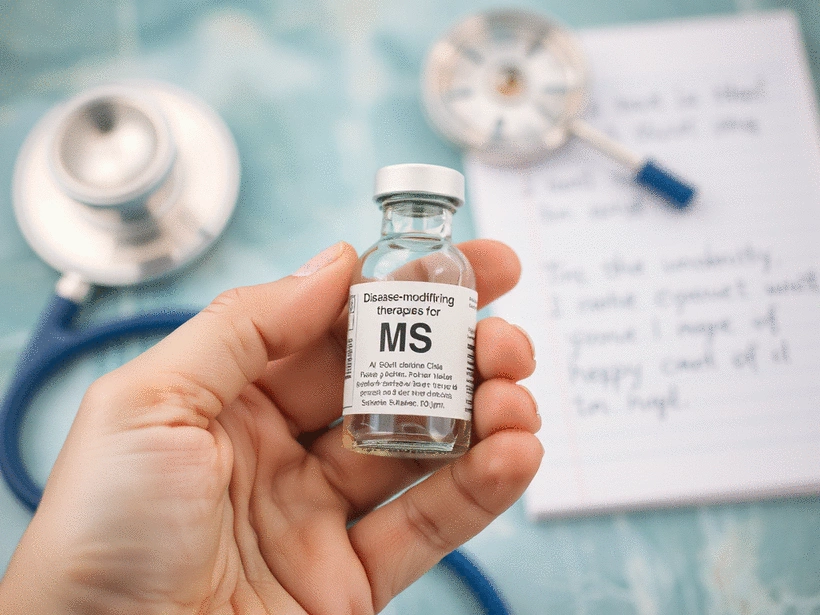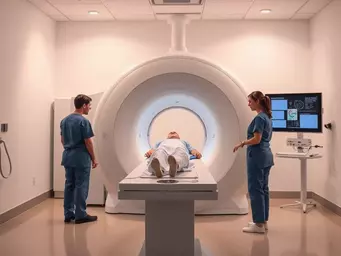Understanding Disease-Modifying Therapies for MS

What if a single conversation could change the trajectory of your health? Engaging with your healthcare provider about multiple sclerosis (MS) and its treatments can empower you to reclaim a sense of control over your journey. Understanding the complexities of MS and the role of Disease-Modifying Therapies (DMTs) can lead to better management and improved quality of life.
What You Will Learn
- Early recognition of MS symptoms, such as fatigue and numbness, is vital for effective management.
- Disease-Modifying Therapies (DMTs) are designed to alter the course of MS, reducing relapse frequency and preserving neurological function.
- DMTs work by targeting specific immunological pathways, including T cell modulation and inflammation reduction.
- Understanding the mechanisms of DMTs empowers patients to make informed healthcare decisions.
- Initiating DMTs early can slow disease progression, reduce relapses, and enhance daily functioning.
- Ongoing engagement with healthcare providers and support communities is crucial for effective MS management.
Key Mechanisms of Disease-Modifying Therapies (DMTs) in MS
DMTs target specific immunological pathways to reduce MS activity and preserve neurological function. Below are the three primary mechanisms.
Modulation of T cells
Regulate the activity of T cells, which are central to the immune response in MS.
Reduction of Inflammation
Lower inflammatory cytokines, mitigating damage to the nervous system.
Prevention of Lymphocyte Migration
Stop immune cells from crossing the blood-brain barrier, limiting attacks on the CNS.
Inhibition of Lymphocyte Proliferation
Limits the number of immune cells that can attack the nervous system.
Understanding Multiple Sclerosis and the Role of Disease-Modifying Therapies
Multiple sclerosis (MS) is a complex and often unpredictable neurological condition that affects thousands of individuals worldwide. It occurs when the immune system mistakenly attacks the protective covering of nerve fibers, leading to a variety of symptoms. These can range from mild sensory disturbances to severe mobility issues. The progression of MS varies greatly; some people experience frequent relapses, while others may have a more gradual decline. Understanding MS is crucial in managing its impact on daily life.
As someone who has dedicated over a decade to supporting patients with MS, I often emphasize the importance of early recognition of symptoms. Identifying these signs early can lead to more effective treatment and a better quality of life. If you've experienced fatigue, tingling sensations, or vision problems, it’s worth discussing with your healthcare provider.

What is Multiple Sclerosis and Its Impact on Patients?
MS manifests in several forms, including relapsing-remitting MS and primary progressive MS. The symptoms can fluctuate and may include:
- Fatigue: A profound and persistent tiredness that interferes with daily activities.
- Numbness: Often in the limbs or face, which can be alarming and confusing.
- Motor issues: Problems with coordination and balance that can lead to falls.
- Cognitive changes: Memory issues or difficulty concentrating, affecting work and personal life.
Living with MS can feel isolating, but understanding the disease can empower you and your loved ones. Engaging with a supportive community, like the one we foster at Symptoms of MS, can provide much-needed encouragement and shared experiences. For a comprehensive overview of MS and its management, you can refer to resources from the National Multiple Sclerosis Society.
Introduction to Disease-Modifying Therapies (DMTs)
Disease-modifying therapies (DMTs) play a crucial role in managing the progression of MS. These medications are designed to alter the course of the disease rather than just treat its symptoms. They work by targeting the immune system and reducing the frequency and severity of relapses, ultimately aiming to preserve neurological function. Further details on the discontinuation of DMTs can be found through resources like the Cleveland Clinic.
It's essential to recognize that DMTs are not a cure for MS; however, they have shown significant promise in improving patients' quality of life. By engaging with your neurologist about DMT options, you can tailor a treatment plan that aligns with your needs and lifestyle.
Mechanism of Action of Disease-Modifying Therapies
Immunological Pathways Targeted by DMTs
DMTs target specific immunological pathways to modify immune responses effectively. This modification reduces MS activity by interfering with the processes that lead to nerve damage. Understanding how these therapies work can help demystify the treatment process and foster trust in your healthcare decisions.
Some of the key immunological pathways affected by DMTs include:
- Modulation of T cells: DMTs can help regulate the activity of T cells, which play a central role in the immune response.
- Reduction of inflammation: By lowering the levels of inflammatory cytokines, DMTs can mitigate damage to the nervous system.
- Prevention of lymphocyte migration: Certain therapies prevent immune cells from crossing the blood-brain barrier, limiting their attack on the central nervous system.
Each therapy may target these pathways in different ways, making it essential to work closely with your healthcare provider to find the right fit for you.
Neuroinflammation and Its Role in MS
Neuroinflammation is a hallmark of multiple sclerosis and significantly contributes to its progression. This process involves the activation of immune cells in the central nervous system, leading to damage of myelin and nerve fibers. Understanding the connection between neuroinflammation and MS can highlight the importance of early intervention and ongoing treatment.
By targeting neuroinflammation, DMTs play a vital role in reducing the overall activity of the disease. It’s encouraging to know that managing this inflammation can result in better outcomes for patients, allowing for more stable disease progression.
Key Mechanisms: Inhibition, Modulation, and Blocking
DMTs employ various mechanisms to combat MS, including:
- Inhibition of lymphocyte proliferation: This limits the number of immune cells that can attack the nervous system.
- Modulation of oxidative stress: By balancing oxidative stress levels, DMTs help protect nerve cells from damage.
- Blocking of pro-inflammatory signals: This prevents further damage to myelin and nerve fibers, preserving neurological function.
Each mechanism plays a unique role in the effectiveness of DMTs. As a neurologist, I stress the importance of understanding these mechanisms to empower patients in their treatment journeys. For an in-depth look at new advancements, consider reviewing articles on the National Center for Biotechnology Information (NCBI).
Pro Tip
Did you know? Engaging in regular physical activity, tailored to your abilities, can significantly enhance your quality of life while managing multiple sclerosis (MS). Exercise not only improves physical strength and balance but also has positive effects on mental health, helping to combat fatigue and depression often associated with MS.
The Importance of Early and Ongoing Treatment in MS
As someone who has dedicated over a decade to understanding multiple sclerosis (MS), I can confidently say that early intervention is crucial. Disease-modifying therapies (DMTs) play a vital role in managing the condition and can significantly improve quality of life for those affected. Research shows that timely treatment can slow the progression of MS and reduce the frequency of relapses.
It’s essential to remember that each patient's experience with MS is unique. Early and ongoing treatment not only helps to manage symptoms but also empowers patients by giving them greater control over their health. Here are some key benefits of starting DMTs early:
- Slower disease progression: Initiating treatment early can reduce the overall impact of MS on the nervous system.
- Fewer relapses: Early DMT administration has been shown to decrease the number of relapses, allowing individuals to maintain a better routine.
- Improved daily functioning: Patients often report enhanced quality of life and ability to perform daily activities.
- Informed decision-making: Engaging in treatment conversations early helps patients understand their options and make choices that align with their lifestyle.
At Symptoms of MS, we emphasize the importance of ongoing treatment. Continuous management allows for adjustments based on how the disease evolves. Regular consultations with your healthcare provider enable personalized approaches, ensuring that the chosen DMT continues to meet your needs effectively.

Frequently Asked Questions About Multiple Sclerosis and DMTs
- What is Multiple Sclerosis (MS)?
- MS is a chronic neurological condition where the immune system attacks the protective covering of nerve fibers, leading to a wide range of symptoms from fatigue to mobility issues.
- What are Disease-Modifying Therapies (DMTs)?
- DMTs are medications designed to alter the course of MS by targeting the immune system, reducing the frequency and severity of relapses, and preserving neurological function.
- How do DMTs work?
- DMTs work by targeting specific immunological pathways, such as modulating T cells, reducing inflammation, preventing lymphocyte migration across the blood-brain barrier, and inhibiting lymphocyte proliferation.
- Are DMTs a cure for MS?
- No, DMTs are not a cure for MS, but they significantly improve patients' quality of life by managing the progression of the disease and reducing relapse rates.
- Why is early treatment important for MS?
- Early initiation of DMTs can slow disease progression, lead to fewer relapses, improve daily functioning, and empower patients to make informed decisions about their health.
- What role does neuroinflammation play in MS?
- Neuroinflammation is a key component of MS, involving immune cell activation in the central nervous system that damages myelin and nerve fibers. DMTs target this inflammation to reduce disease activity.
Encouraging Engagement and Continued Learning
As you navigate your MS journey, it’s vital to engage actively with your healthcare providers. Don't hesitate to voice your concerns or ask about new treatment options. Staying informed about emerging therapies can lead to more tailored and effective management plans.
Consider these steps to enhance your engagement in your treatment:
- Schedule regular appointments: Keep up with follow-ups to monitor the disease and discuss any new symptoms or concerns.
- Ask questions: Prepare questions for your doctor about DMTs, potential side effects, and recent advances in MS treatment.
- Educate yourself: Utilize resources from Symptoms of MS to stay current on research and treatment options available.
- Connect with others: Join support groups or online forums to share experiences and learn from others living with MS.
Remember, your health is a partnership between you and your healthcare team. By engaging actively and continuing to learn, you can navigate the complexities of MS with greater confidence and empowerment!
Recap of Key Points
Here is a quick recap of the important points discussed in the article:
- Early Recognition: Identifying symptoms like fatigue and numbness early can lead to more effective treatment.
- Disease-Modifying Therapies (DMTs): These therapies alter the course of MS and help manage symptoms but are not a cure.
- Understanding Mechanisms: DMTs target specific immunological pathways to reduce MS activity and preserve neurological function.
- Importance of Ongoing Treatment: Continuous management and regular consultations with healthcare providers enable personalized approaches to treatment.
- Engagement and Education: Actively participating in treatment discussions and staying informed can empower patients in their care journey.









